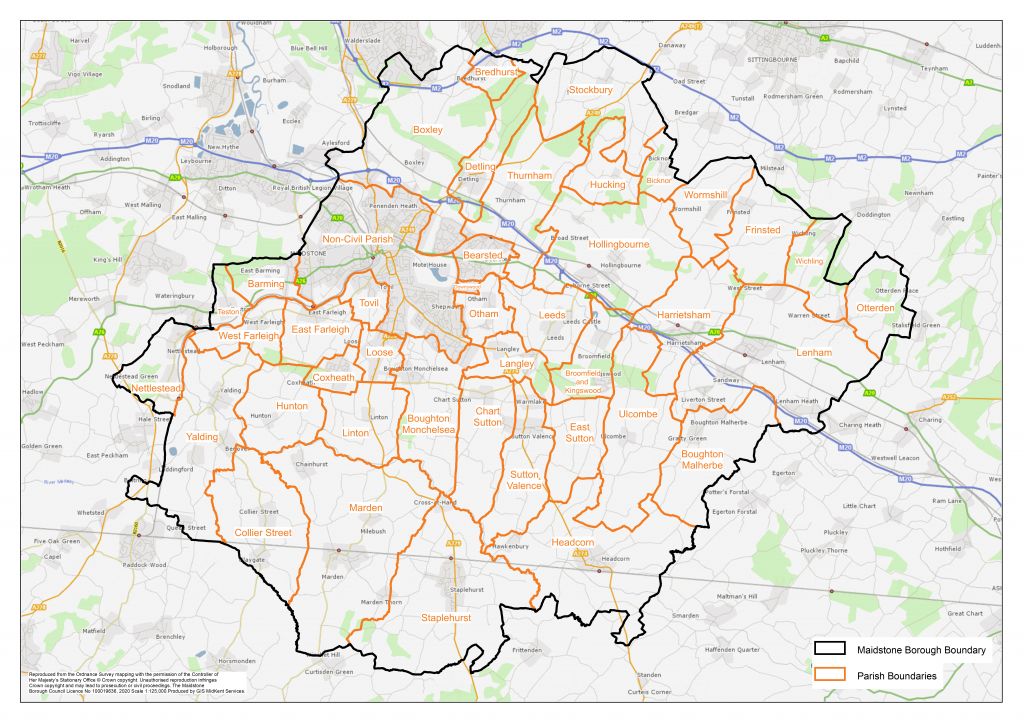Borough politics
Our Business - Local Government
If you are new to local government, you may find it useful to understand the role of local government and exactly what Maidstone Borough Council does. In practice many services are delivered by working together with our partners in local government (Kent County Council and Parish Councils) and across the public sector including with police, fire and health services.
Maidstone Borough Council
Parish Councils
Parishes have powers to spend money on the following:
- Allotment
- Open spaces and playing fields
- Community halls
- Roadside verges
- Seats and shelters
- Footway lighting
- Cleansing
Maidstone is made up of the unparished town and 41 parishes, 35 of which have parish councils. The map below shows the parish boundaries:

The council has a statutory obligation to support the community in times of emergency e.g. floods. Employees are required to assist in the Emergency Plan and training will be provided for those staff selected for specific roles. You should be aware that you may be called upon at any time.
How are decisions made?
The Council comprises 55 Councillors, with one-third elected three years out of every four. Councillors are elected for an area known as a ‘ward’ and help to sort out problems in the area and speak up for the public. Councillors are democratically accountable to people in their ward, but they also have an over-arching duty to the whole community, including people who did not vote for them.
Councillors are elected for a period of four years and hold office from the fourth day after being elected until four days after the next regular election four years later (unless they resign or become disqualified). Where a Councillor ceases to hold office within the four-year period, a vacancy arises. A by-election will be held unless the vacancy arises within 6 months of the next regular Council elections. Only registered voters of the Borough or those living or working in the Borough are eligible to hold the office of Councillor.
All Councillors meet together as the full Council (this is why Councillors are sometimes known as ‘Members’ of the Council). Meetings of the Council are normally open to the public. Here Councillors decide the Council's overall policies and set the budget each year. The Council also elects the Leader of the Council.
The Council delegates most of the decision-making to a range of Committees and Sub-Committees as shown below:
- Urgency Committee
- Services Committees
- Strategic Planning, Sustainability and Transport Committee
- Communities, Housing and Environment Committee
- Heritage, Culture and Leisure Committee
- Full Council
- Employment Committee
- Democracy Committee (replaces General Purposes)
- Joint Transportation Board
- Estate Committee - Cobtree Manor
- Regulatory Committee
- Planning Committee
- Planning Referrals
- Audit, Governance and Standards Committee
- Licensing Committee
How the decisions are implemented?
The council employs officers to give advice, implement decisions and manage the day-to-day running of the organisation. Employees of the council are known as ‘Officers’ and elected
Councillors are known as ‘Members’. A code of practice which governs the relationships between officers and Councillors is available on the intranet within the Code of Conduct.
The organisation works as one to develop the borough and deliver its policies effectively.
Members and officers of the council work together to ensure the vision is achieved.
The roles are complementary: Councillors and Officers working together to achieve success!


